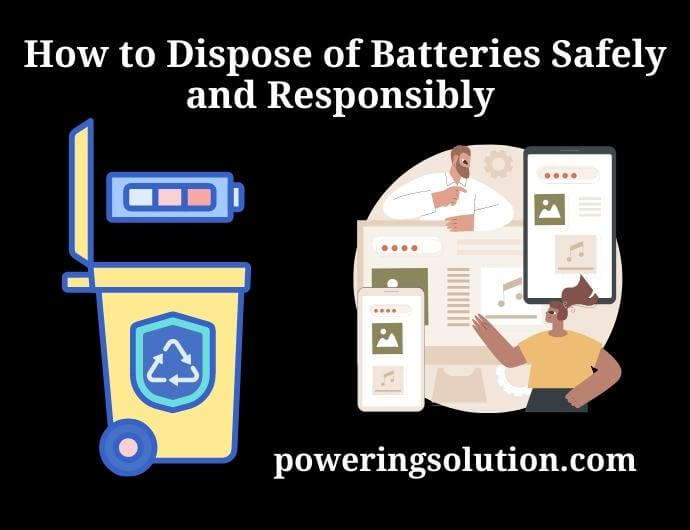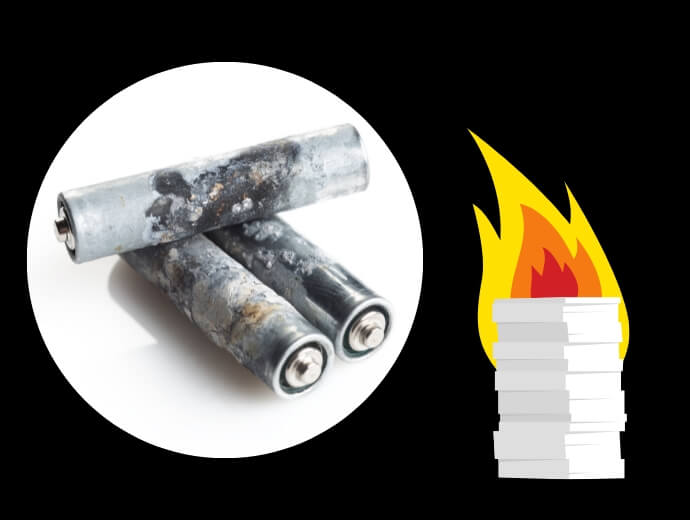Batteries are an integral part of our daily lives, powering our smartphones, laptops, and other electronic devices. However, they can pose a significant threat to the environment and human health if not disposed of properly.

Many batteries contain harmful chemicals that can leak into the soil and water, contaminating the environment and potentially causing harm to wildlife and humans. In this article, we will discuss the importance of proper battery disposal and provide information on how to dispose of batteries safely.
Why Is Proper Battery Disposal Important?
Proper battery disposal is important for several reasons. One of the main reasons is that many batteries contain hazardous materials, such as lead, cadmium, and mercury. If these materials are not disposed of properly, they can contaminate the environment and cause harm to humans, animals, and plants. When batteries are thrown in the trash, they can end up in landfills, where they can leach these harmful chemicals into the soil and groundwater.
Improper battery disposal can pose a fire hazard. Batteries can explode or catch fire if they are damaged, crushed, or punctured, especially in large numbers or when they are stored with other combustible materials. This can cause damage to property, harm to people, and even fatalities.
To these safety concerns, proper battery disposal is important because it conserves natural resources. Batteries can be recycled, and the materials that are recovered can be used to make new batteries, reducing the need for new raw materials. Recycling batteries also reduces the amount of waste that ends up in landfills, which helps to preserve valuable space and reduce the environmental impact of waste disposal.
Harmful Effects of Improper Battery Disposal
Improper battery disposal can have several harmful effects on the environment, wildlife, and human health. Many batteries contain toxic and hazardous materials that can contaminate the soil, water, and air if they are not disposed of properly.

One of the most significant impacts of improper battery disposal is the pollution of soil and water. When batteries are thrown in the trash or landfills, they can leak harmful chemicals like lead, mercury, and cadmium into the surrounding environment. These chemicals can then contaminate the soil and water, making it unsafe for plants and animals to thrive.
The pollution of waterways is particularly concerning because it can spread the toxic effects of improper battery disposal over a much larger area. The toxic chemicals from batteries can cause a wide range of health problems, including skin irritation, respiratory issues, and even cancer in humans and animals.
Another harmful effect of improper battery disposal is the fire hazard it poses. Batteries can catch fire if they are damaged, punctured, or exposed to heat, and this can cause significant harm to both people and the environment. Batteries that catch fire can release toxic fumes, which can pose a health hazard to anyone in the area.
Improper battery disposal can also contribute to climate change. Batteries that are thrown in the trash can end up in landfills where they release methane gas, a potent greenhouse gas that contributes to climate change.
How to Dispose of Batteries Safely?
Properly disposing of batteries is essential to protect the environment, wildlife, and human health. It’s important to know how to dispose of batteries safely to prevent the release of harmful chemicals into the environment. Here are some tips for safe battery disposal:
- Check with your local recycling program: Many cities and towns have battery recycling programs that allow you to drop off batteries for recycling. Check with your local recycling center to see if they accept batteries and what types of batteries they can recycle.
- Use a battery recycling service: Many companies offer battery recycling services. You can mail your used batteries to these companies, and they will recycle them safely. These services can be found online.
- Use a battery drop-off location: Some retailers and businesses offer battery drop-off locations. You can drop off your used batteries at these locations, and they will be recycled safely. Check with your local retailers to see if they offer this service.
- Store batteries safely: When storing batteries, make sure they are kept away from heat and moisture. Store them in a cool, dry place until you can dispose of them properly.
- Do not throw batteries in the trash: Throwing batteries in the trash can be harmful to the environment. Batteries contain toxic chemicals that can leach into the soil and water. It’s important to recycle them properly to prevent this from happening.
There are several ways to dispose of batteries safely. It’s important to recycle them properly to prevent the release of harmful chemicals into the environment.
Types of Batteries and How to Dispose of Them
There are several types of batteries, and each type requires a different method of disposal. Properly disposing of batteries is important to prevent the release of harmful chemicals into the environment. Here are some common types of batteries and how to dispose of them safely:
| Alkaline batteries | Alkaline batteries are the most common type of battery, used in a variety of household items. They do not contain hazardous materials and can be safely disposed of in the regular trash. However, some cities and towns have battery recycling programs that accept alkaline batteries for recycling. |
| Rechargeable batteries | Rechargeable batteries are commonly used in electronics, power tools, and other items. They contain materials like nickel, cadmium, and lead, which can be harmful if they are not recycled properly. These batteries should be recycled through a battery recycling program or at a drop-off location. |
| Lithium-ion batteries | Lithium-ion batteries are commonly used in cell phones, laptops, and other portable devices. They should be recycled through a battery recycling program or at a drop-off location. These batteries are often considered hazardous waste and should not be thrown in the trash. |
| Lead-acid batteries | Lead-acid batteries are commonly used in cars, boats, and other vehicles. These batteries are considered hazardous waste and should be recycled through a battery recycling program or at a drop-off location. |
| Nickel-cadmium batteries | Nickel-cadmium batteries are commonly used in power tools, electronic toys, and other items. These batteries should be recycled through a battery recycling program or at a drop-off location. |
| Button batteries | Button batteries are commonly used in watches, hearing aids, and other small electronic devices. They contain hazardous materials and should be recycled through a battery recycling program or at a drop-off location. |
Different types of batteries require different methods of disposal. It’s important to dispose of batteries safely to prevent the release of harmful chemicals into the environment. You can ensure that your batteries are disposed of safely and responsibly by taking the steps.
Common Myths About Battery Disposal
There are several common myths surrounding battery disposal that can lead to improper disposal and potential harm to the environment and human health. Here are a few of those myths:
Myth #1: It’s Safe to Throw Batteries in the Trash
This is a common misconception that can be harmful to the environment and human health. As we mentioned earlier, batteries contain chemicals that can be harmful to the environment and human health, and should never be thrown in the trash. When batteries are disposed of in landfills, they can leak toxic chemicals into the soil and groundwater, which can cause pollution and harm to the environment and wildlife.
Myth #2: It’s Okay to Recycle Batteries with Household Items
Mixing batteries with other household items can be dangerous and lead to fires. When batteries come into contact with other metal objects, they can cause a short circuit and start a fire. You have to know that A battery short occurs when the current flowing through the battery is interrupted.
It’s important to keep batteries separate from other items and recycle them through the proper channels.
Myth #3: All Batteries Can Be Recycled
Not all batteries can be recycled, and it’s important to know which types of batteries can be recycled and which cannot. For example, lithium-ion batteries used in cell phones and laptops can be recycled, but alkaline batteries used in remote controls and other household items cannot be recycled. Check with your local recycling center to find out which types of batteries they accept.
Myth #4: Used Batteries are No Longer Hazardous
Even when batteries no longer work, they can still be hazardous and contain chemicals that can harm the environment and human health. It’s important to handle used batteries with care and recycle them through the proper channels to prevent harm to the environment and wildlife.
Myth #5: It’s Okay to Bury Batteries in the Ground
Burying batteries in the ground is not a safe disposal method and can harm the environment and human health. Batteries can leak toxic chemicals into the soil and groundwater, which can cause pollution and harm to the environment and wildlife. It’s important to recycle batteries through the proper channels to ensure they are disposed of safely and responsibly.
FAQs
Can I Throw Batteries in the Trash?
Alkaline batteries can be thrown in the trash, but it’s recommended to recycle them through a battery recycling program if available. Other types of batteries, such as rechargeable, lithium-ion, and lead-acid batteries, should not be thrown in the trash and should be recycled through a battery recycling program or at a drop-off location.
Can I Mix Different Types of Batteries When Recycling?
It’s best to sort batteries by type before recycling to prevent cross-contamination of materials. Some battery recycling programs may accept different types of batteries together, but it’s recommended to check with the program or drop-off location beforehand.
What Should I Do if a Battery Leaks?
If a battery leaks, it’s important to handle it with care and dispose of it properly. Wear gloves and use a plastic bag to pick up the battery. Seal the bag and dispose of it in a battery recycling program or at a drop-off location. Do not throw the battery in the trash.
It’s important to dispose of batteries properly to prevent harm to the environment and human health. Check with your local recycling center, retailers, or businesses for battery recycling programs or drop-off locations. Sort batteries by type before recycling and handle leaked batteries with care.
Can I Recycle Batteries at Home?
It’s not recommended to recycle batteries at home. Battery recycling involves separating the materials and disposing of them safely. It’s best to recycle batteries through a battery recycling program or at a drop-off location.
Wrap Up
In conclusion, proper battery disposal is essential to protecting the environment and human health. Recycling batteries through proper channels is the safest and most responsible way to dispose of them.
Not all batteries can be recycled, and it’s important to know which types of batteries can and cannot be recycled. It’s also important to never throw batteries in the trash, as they can cause pollution and harm to the environment and wildlife. By taking the necessary steps to properly dispose of batteries, we can all play a role in creating a cleaner and safer world.
Read more:
